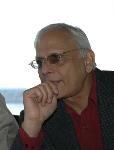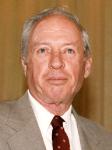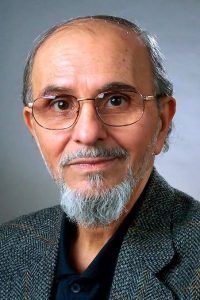Muhammad Umar Memon
Tribute by Farhat Haq, Monmouth College
It is with heavy heart that I pen these words of gratitude to Professor Muhammad Umar Memon who died on Monday, June 4, 2018. Professor Memon had a long affiliation with AIPS and his singular contribution towards keeping alive the only journal of Urdu in English Language: Annual of Urdu Studies was exemplary. The annual was started at University of Chicago in 1980 and Professor Memon became its editor in 1993. The annual survived despite many ups and downs because of Professor Memon’s refusal to let any hurdle stand in his way. He once said that “Urdu is my mother tongue and the love of my life,” and he fought hard for the love of his life. I remember many meetings of AIPS Board of Trustees where Professor Memon passionately pleaded for support to keep the annual going. I generally saw him once a year at the South Asia conference in Madison, Wisconsin and always had memorable conversations with him. I will miss that mischievous twinkle in his eyes as he most eloquently commented on what he saw as the crass commercialization of higher education where one has to beg and plead to keep a literary endeavor going.
Adam Nayyar

Adam Nayyar, Pakistan’s foremost cultural anthropologist, ethnomusicologist and cultural interlocutor par excellence, passed away in Islamabad on July 29, 2008. He was a brilliant scholar and good friend to the many researchers, journalists, scholars and writers who sought him out. His effect on the scholarship of Pakistan was profound.
He was born on December 10, 1948 and grew up in Bahawalpur. He earned an engineering degree from the University of Engineering and Technology, Lahore, and a Ph.D. in anthropology from the University of Heidelberg, Germany. Formerly, as the Director of Lok Virsa, the National Institute of Folk and Traditional Heritage in Islamabad, and most recently, Director-General of the Pakistan National Council of the Arts, he championed traditional music and the arts of Pakistan and helped develop cultural policies to support musicians and artists. In February, 2008, he was conferred the title, “Chevalier de l’ordre des Arts et des Lettres” by the Republic of France.
Adam’s passing is a great loss for Pakistan, and for all of us who came to know and love him.
Russell Blackwood

Russell Blackwood, the John Stewart Kennedy Professor of Philosophy, Emeritus, at Hamilton College in New York, passed away on January 12, 2007 at the age of 78.
John Richards

John F. Richards, Professor of History at Duke University, and a long-time supporter of the American Institute of Pakistan Studies, died at home in Durham, NC on August 23, 2007 at the age of 68. John was diagnosed with prostate cancer in 2005.
John began his career as a historian of the Mughal Empire, and later expanded his interests widely. Building from his initial interest in Mughal India, John developed into a leading world historian of the early modern era. His career was marked by a combination of careful historical research and a concern for broad and innovative new historical approaches. Though South Asia remained a central focus of John’s academic interests throughout his career, he was one of the leading bridge-builders across academic divides, collaborating on a range of topics that cut across disciplines and across regions of study. His prolific academic output was matched by his leadership in a range of academic projects.
John received his doctoral degree in History from the University of California, Berkeley in 1970, writing his doctoral dissertation on Mughal rule in Golconda in the late 17th and early 18th centuries under the direction of Prof. Thomas Metcalf (later published as Mughal Administration in Golconda in 1975). This established him as one of the leading historians of the Mughal Empire in the United States. He published in 1993 a survey of Mughal history in the The New Cambridge History of India Series, which remains one of the most widely referenced surveys of Mughal history. He also edited two critically important collections of articles on the Mughals and their era, The Imperial Monetary System of Mughal India (1987) and Kingship and Authority in South Asia (1998).
John’s interests, however, expanded from Mughal India to include the larger transformations that shaped the modern world. He always insisted that the Mughal Empire should be considered an early modern empire (rather than a “medieval” empire, as it had often been treated previously) as its structure and influence were intimately linked to the world-wide transformations of the early modern era. John’s interests thus broadened to include world trade, which led him to begin a course at Duke on the importance of the trade in opium and narcotics in world history. He also maintained an interest in the comparative importance of structures of state finance, including not only those of the Mughals, but the British colonial state as well. Perhaps most significantly, these interests pushed him into the study of world environmental history during the early modern period, which led first to an innovative course on this at Duke University and ultimately to the publication of the pathbreaking, The Unending Frontier: Environmental History of the Early Modern World (2003).
To recount John’s important academic projects is hardly enough to sum up his career. He was a man of extraordinary energy and played an important role in the institutional structure of the field of South Asian studies. He served for many years as Chair of the Board of Directors of the Council of American Overseas Research Centers, from which position he was a strong supporter of the activities of AIPS. More directly, he played an active role in the reform and reorganization of AIPS during some of its most difficult years. He was also the driving force behind the establishment of the American Institute of Afghanistan Studies and convened the inaugural meeting of the Institute at Duke in 2003.
John was also an unfailingly generous mentor to a large number of students and colleagues in the field. He was a man with strong academic opinions and a love of intellectual argument. He will be greatly missed by all who had the good fortune to know him.
Craig Baxter

Tribute by Frank Conlon, University of Washington
It is my sad duty to report the passing of Craig Baxter, Professor Emeritus of History and Political Science at Juniata College, in hospice near his home in Huntingdon, Pennsylvania on Feburary 7, 2008 after a brief illness.
Many of us knew Craig for his steady production of high quality scholarship on South Asian politics and on the history of Pakistan and Bangladesh. He was active in the American Institute of Pakistan Studies, serving a term as its president, and was among the organizers and first president of the American Institute of Bangladesh Studies.
To those of us who also knew him in the corridors of conferences and academic committees, it must be said that he was, surely, one of the nicest people in our field–by personality and career training in the Foreign Service, he was a diplomat and a person of great affirmative strength. It was always a pleasure to see Craig at the AAS annual conference or the Conference on South Asia in Madison.
Craig’s formal education was at the University of Pennsylvania, where he earned a BS in Economics in 1951 and, after military service, an AM in Political Science in 1954 prior to his joining the Foreign Service. During intervals in his career he completed his PhD at Penn in 1967 writing a dissertation in History on “The Jana Sangh, a biography of an Indian political party.” This study became his first book of the same title published by the University of Pennsylvania Press in 1969 and and Bombay: Oxford University Press, 1971.
Craig had state department overseas postings in India 1958-64 (Bombay and Delhi), in Pakistan (Lahore) 1965-68, Ghana (Accra) 1974-76 and Bangladesh (Dhaka) 1976-77. Between 1968 and 1971 he was posted in Washington, D.C. as a senior political officer for Pakistan and Afghanistan. He was a Visiting Associate Professor in Social Sciences, United States Military Academy 1971-74 and later also taught at the Northern Virginia Center of the University of Virginia (now George Mason University) and at Mount Vernon College. In 1969-71 he was Adjunct Lecturer in International Relations and History at the University of Pennsylvania.
Following his government service, he joined the faculty of Juniata College in Huntingdon, Pennsylvania where he was Professor of History and Political Science from 1982 to 1990, though he continued as chair of Political Science 1991-94.
Craig’s ability to serve organizations and institutions was legendary. His many roles over his career, included service as a consultant to: National Foreign Estimate Center; Department of State; United States Information Agency; Development Committee, American Institute of Indian Studies; Asia Foundation; Asia Society; Georgetown University Center for Strategic and International Studies; Middle East Institute; National Defense University and the National Bureau for Asian Research, Seattle. He was called upon as an expert witness for various Congressional committees.
Combining his scholarly interests in South Asia with his extensive field experience, it was probably inevitable that Craig would take a leading role in promoting American scholarship on the region. In particular his interests in Pakistan and Bangladesh were well known. He was Chairman of the Founding Committee of the American Institute of Bangladesh Studies (1983-84) and AIBS President (1984-2000). He served as a Trustee of the American Institute of Pakistan Studies (1988-2002), as a Member, Executive Committee, 1991-93 and AIPS President, 1993-1999. He was a strong supporter and participant in the Middle Atlantic Region Conference of the Association of Asian Studies, serving in various official capacities from 1988 to 1994. Craig was presented with the honor of “Distinguished Asianist” by the Mid-Atlantic Region of the Association for Asian Studies in 2002–a reflection of both his prodigious scholarship and his continued support for that regional AAS conference.
I conclude this note with a bibliography of most of Craig’s publications. I think I speak for many people who would agree that Craig Baxter was a person of unusual qualities; unusual energy, unusual interests, unusual grace and unusual friendliness–we all were the better for having known him.
Allen Keith Jones
Allen Jones died on February 9, 2008 in Washington, DC of esophageal cancer. Born in Glasgow, Scotland, Jones was the son of Anglo-American missionaries in India and Pakistan. He attended Woodstock School in Landour, Uttaranchal, India, and graduated from Winston Churchill Collegiate Institute in Scarborough, Ontario. Mr. Jones received his BA from Westminster College in New Wilmington, PA and his Ph.D. from Duke University. Supported by a Fulbright fellowship, his doctoral thesis was published by Oxford University Press, Karachi, and entitled Politics in Sindh, 1907-1940: Muslim Identity and the Demand for Pakistan. Dr. Jones pursued a life of service in international development, primarily in refugee resettlement and public health. He worked for years on Afghan refugee programs in Peshawar, Pakistan and later consulted with the World Bank, the US Agency for International Development and other organizations. From 1997 to 2007, he served as Secretary-General of the World Federation of Public Health Associations, a position from which he helped coordinate public health programs and international congresses around the world. Upon news of his passing, accolades and remembrances came in from many countries, including Pakistan, Turkey, Mozambique, China, Papua New Guinea, and Switzerland. He is survived by Beverly McWilliams Jones, his wife of 17 years, and a son, Andrew.

